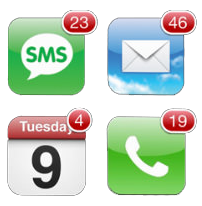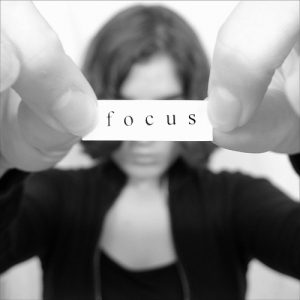The ability to focus is becoming rare
With the arrival of the digital age our attention spans have dropped significantly. If inspecting our surroundings is not sufficient to convince us of that, we can look to relevant research. One eye-catching study done by Microsoft determined that the average attention span had dropped from 12 to 8 seconds over a period of 3 years starting 2000. That study was published 2013, and there is little to suggest that the downward trend is reversing. But why are attention spans decreasing? Let’s investigate the main culprits.
Intrusive notifications
 An intrusive notification is when your device screams out for attention, despite you not consciously having asked it to do so. The sound and light that the device emits have classically conditioned us to expect a reward which can come in the form of an invite to a party, a friendly message that brightens the mood, or perhaps a display of affection from a loved one. It does not matter that the reward is not always there, the possibility of a reward is more than enough to make us compulsively check the phone.
An intrusive notification is when your device screams out for attention, despite you not consciously having asked it to do so. The sound and light that the device emits have classically conditioned us to expect a reward which can come in the form of an invite to a party, a friendly message that brightens the mood, or perhaps a display of affection from a loved one. It does not matter that the reward is not always there, the possibility of a reward is more than enough to make us compulsively check the phone.
But not all notifications are bad. When they are the result of a users direct intent, such as when setting an alarm, they can be of great use. Situation-relevant notifications are another category of notifications that provide real value. An example of this is how email clients show the number of unread messages upon launching. This bit of information is likely sought after by someone opening email, so presenting it to the user upfront is doing them a favor in most cases.
Bite-sized culture
Another driving force behind the decrease in attention we are witnessing, is the way content in general is becoming shorter and more disposable. The changing nature of content can be seen as a consequence of publications trying to produce more content and at a higher rate than ever before. After all, when the amount of shares and likes an article or post gets is considered to be the most accurate measurement of its success, the move to low density and high frequency content makes perfect sense. Why bother with an article if most people will not even read past the headline.
As we get served more bite-sized content we get used to it and start expecting other content providers to follow the same format. You could argue that the publications are changing to fit our tastes better, but I maintain that the search for viral content is the driving factor behind this change in format.
The value of attention

Most of us remember when multitasking was the big thing and the ability to “juggle many tasks” became a cliché phrase during job interviews. Today the view on multitasking has changed and the implied increase in productivity of doing multiple things at the same time has been written off as myth.
The reason for this is that every time we switch our focus, there is a start/stop period where the brain needs to rev up and get acquainted with the new task at hand. This means that if we are constantly switching what we are doing we are constantly in that start/stop period, never actually entering a flow state where we can do great and productive work. Cal Newport, author and associate professor of computer science at Georgetown, has written extensively on the benefits of prolonged focused work in his book Deep Work, which is definetly worth checking out.
Less anxiousness
We all know the feeling too well; the hand being drawn towards the phone, like the hand of Frodo towards the one ring. It is a compulsion that is hard to resist and can easily be rationalized by telling yourself that you just need to check if so-and-so has called, or the weather, or a stock price or whatever. But the truth is that most of the time we have no real reason for looking at the phone, except for the weird feeling of comfort it gives us. If the phone is out of batteries or we are somewhere with low reception, there is then a tendency to get anxious. The phenomena has even warranted a new (and silly) term, Nomophobia.
The feelings of anxiousness when not instantly reachable result in many choosing to stay online at all times of the day, but this is a bad solution as it affects the attention span negatively for reasons previously discussed. What we are really talking about is an addictive behavior that should be combated.
Attention equals money
At the time of writing the market cap of Facebook is 366 billion dollar, the main value of the company lying in trading your attention to people who want to influence you. Every time you click a link the advertiser has to pay roughly $1, and every time you simply scroll over a link (Facebook calls this impressions) the advertiser has to pay 0,1 cents. Just imagine if you lost $1 every time you clicked on some link that popped up in your newsfeed, or that you lost 0,1 cents every time you glanced at something on the screen. The numbers would quickly stack up and you would become very selective with where you spent your time and focus online.
Really take these numbers in and feel the truth of the matter. Your attention is valuable, and the person it is most valuable to is you.
Taking control over your attention
So what do we do? How do we stay focused in a world that seems to be grappling for our attention at all times? Well, there are a couple of things you can modify in your life to reap the benefits of focus mentioned earlier.
Opting out of intrusive notifications
The first thing would be to disabling the following in your devices:
- All message notification sounds (Whatsapp, Twitter, iMessage, Facebook etc.)
- News-feed notifications
- New episode (podcast/tv-series/albums) notifications
- LED light notification (Android app for doing this)
- Any other service that presents you with information in a way that you cannot control
The reasoning for disabling these things is to have control over when to receive new information. For example there is little need to know a new e-mail has arrived the second it hits the inbox (honestly, I don’t think I’ve ever received an e-mail that could not wait an hour). A sound notification for e-mails will thus only distract you without bringing any real benefit.
Disabling the different feed type notifications can be effective for avoiding going down rabbit holes you did not plan on. For example imagine you picked up your phone to send a text to a friend, and the second you turn the screen on there is a news headline about a horrible terror attack in Yemen. At this point the quick text to a friend is likely to turn into 15 minutes of reading the news story and researching Yemen on Wikipedia.
Don’t be reactive
The urge to respond the second the message hits your device is a strong one, but if your top priority is to constantly respond to people you will never get anything done.
Instead of being reactive to incoming messages, try to allocating a couple of time slots during the day when you answer everyone at once. This way you get the improved efficiency of focusing on a single task for a prolonged period of time, and you don’t have to interrupt the work you are doing constantly.
If you have previously been hyper-responsive it is likely that you have some people in your life that would get offended/worried if you suddenly responded within hours instead of minutes. In those cases I would recommend introducing the change gradually. Instead of responding within minutes, wait half an hour, and then continue moving up the response time until it is at a point where you feel comfortable.
Establish a hotline
 Of course there are some things that are truly important and need our attention right away (although these things are rare). For these purposes we can setup a “hot-line”, in my case the hotline is to call my phone. That is the only way that the phone will sound right away, and since people rarely use the call function where I live (Sweden) I will know that it is truly urgent if they do.
Of course there are some things that are truly important and need our attention right away (although these things are rare). For these purposes we can setup a “hot-line”, in my case the hotline is to call my phone. That is the only way that the phone will sound right away, and since people rarely use the call function where I live (Sweden) I will know that it is truly urgent if they do.
But exercise a great deal of caution around who, and for what purposes you share your hotline details. Remember that nearly all matters can wait a couple of hours.
Go semi-offline
The last thing I suggest for taking back control over your attention is to not contract internet on your cell phone. And before you bring out the pitchforks and scream heretic, let me explain.
Wi-Fi is widely available and you can almost certainly connect to it at home, work and on campus. For most of us this means that the only time not having a data plan would really affect us is when we are in transit or walking about. Those who really need to get in touch with you will still be able to call and meanwhile you can enjoy the liberating feeling of not being connected for some time. From personal experience I have found that doing this significantly reduces the need to check the phone every couple of seconds as it becomes harder to rationalize that behavior.
I strongly encourage people to try this for a month and notice the difference. Note that turning cellular data off is not nearly as effective. Turning it back on might simply be too tempting.
Final notes
I hope I don’t come across as a Luddite in this article. I think modern smartphones are incredible, something that people 30 years ago could not even imagine existing. Yet the widespread adaption has brought some side-effect that were not intended by the designers of these devices.
Also I would like to point out that if you manage to become one of the few that successfully cultivate the ability to focus intently on a single task for longer periods of time, you will become that much more valuable in a world where it is an increasingly rare attribute.